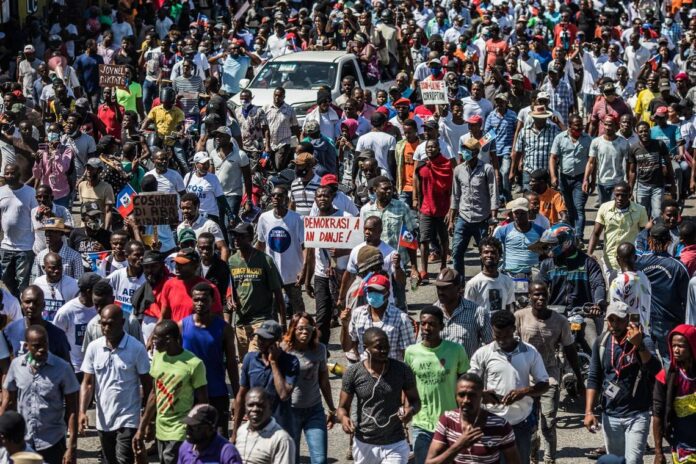
Thousands of Haitians marched through the streets of Haiti’s capital, Port-au-Prince, on Feb. 14, demanding that President Jovenel Moïse step down and signaling that his fight to stay in power for at least another year is far from over.
Article 134.2 of Haiti’s 1987 Constitution, as well as the 2015 Electoral Law, dictate that he should have stepped down on Feb. 7, according to not just Haiti’s opposition but the Haitian Bar Association (FBH) and the Superior Council of the Judicial Power (CSPJ).
The Biden administration had justified its continuation of the Trump administration’s support for Moïse on the basis of the Haitian opposition’s anemic mobilizations until now.
“The remarkable lack of popular response to calls for mass protest in recent weeks – it indicates to us that the Haitian people are tired of endless lockdowns, squabbling over power,” said State Department spokesman Ned Price in a Feb. 12, 2021 press briefing that followed Washington’s Feb. 5 statement of support for Jovenel’s remaining in office.
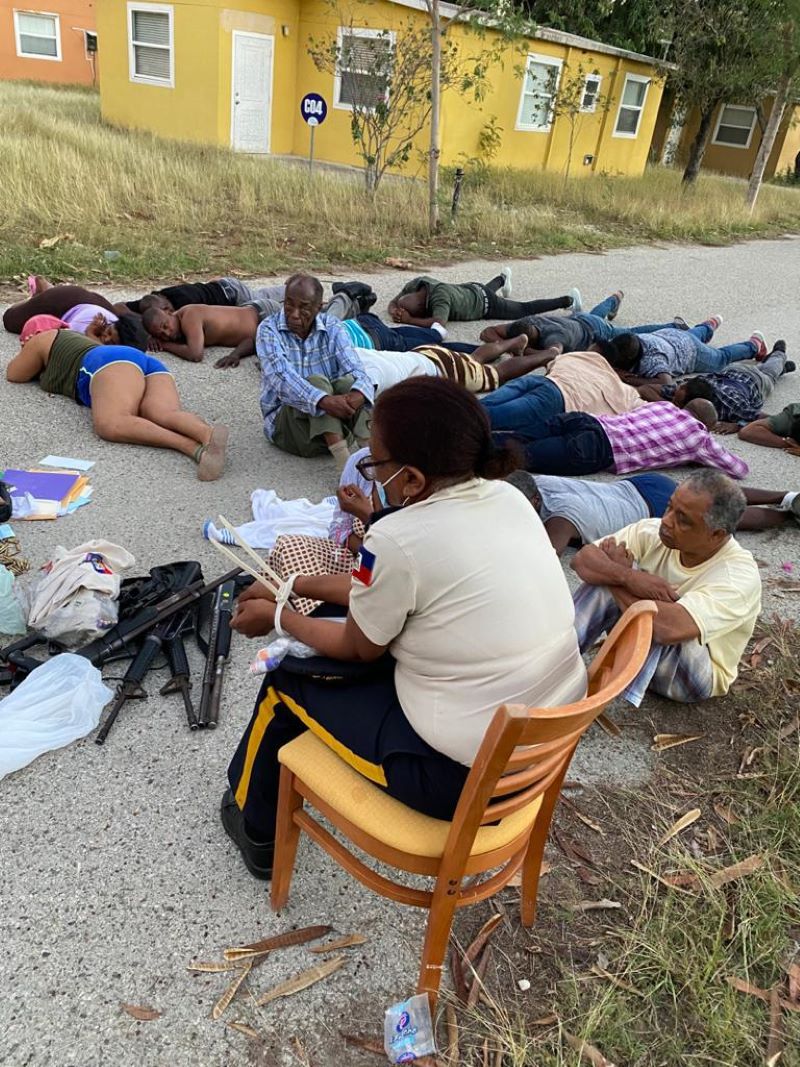
But the massive protest last weekend may change that calculus, along with pressure from Congressional Democrats who have issued trenchant condemnations of Moïse and backed opposition moves to set up a transitional government to hold presidential, parliamentary, and municipal elections.
“Feb 7th marks the end of Pres Moise’s term in Haiti,” tweeted Sen. Patrick Leahy (D-VT) on Feb. 6. “The country is in worse shape than when he began w/ rampant poverty, corruption & gang violence in which the govt is complicit. The U.S. should join in calling for an inclusive transition that represents the Haitian people.”
Leahy’s pressure comes on the heels of letters and statements by a posse of U.S. Congresspeople led by Rep. Andrew Levin (D-MI), who has become the House of Representatives’ most outspoken critic of Jovenel.
“Moïse is demonstrating what my colleagues and I have said: there is zero chance of real elections, real democracy or real accountability while he remains in power,” Levin tweeted on Feb. 7. “I am deeply saddened but unsurprised that Moïse has escalated his anti-democratic campaign with a mass arrest of opposition officials and others on what should be his final day in office.”
Levin was referring to the round-up in the early morning hours of Feb. 7 of 23 people whom Jovenel Moïse claimed were planning a coup d’état against him. Among those arrested were Supreme Court Justice Yvickel Dabrésil (who was to have been appointed Provisional President by opposition’s National Commission for the Establishment of the Transition or CNT), Police Inspector General Marie Louise Gauthier (the #2 ranking officer in the Haitian National Police or PNH), four other PNH officers, three of Dabrésil’s family members and his driver, and agronomist Louis Buteau.
Soon after the arrests, excerpts from phone conversations between Gauthier and the head of the Unit for the National Palace’s General Security (USGPN) Dimitri Hérard went online. The astonishingly naïve Gauthier spoke openly to Hérard, one of Moïse’s most unconditional allies, of her plans to detain the president at about the time his term was expiring. Hérard taped the supposedly secret conversations, in which he played along, and then later led the arrests of Gauthier and others at a residential development called Petit Bois near the U.S. Embassy in the capital’s suburb, Tabarre.
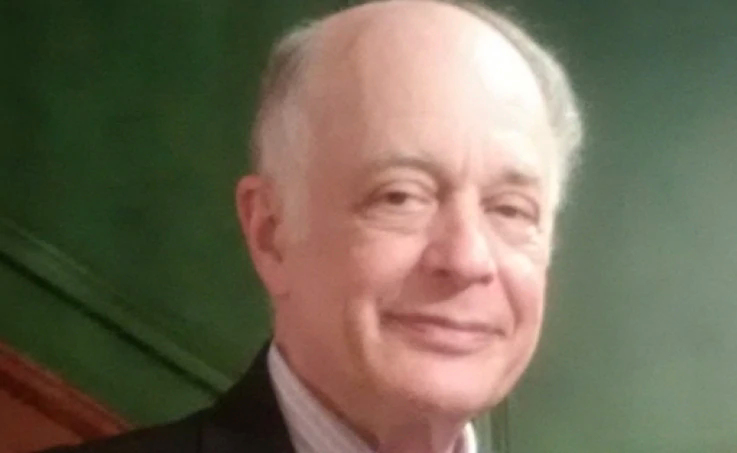
“I’ve received orders from the [U.S.] State Department,” Gauthier begins her initial conversation with Hérard, who quickly responds “They contacted me too, so I was awaiting your call.”
It appears that Gauthier was fooled, not only by Hérard, but by someone impersonating a former U.S. State Department Foreign Service officer, Dan Whitman, who had been stationed in Haiti two decades ago. He was supposedly the U.S. State Department official who “ordered” Jovenel’s arrest.
“I don’t know who is spreading this narrative, or why,” replied Whitman on Feb. 8 when questioned by the Voice of America’s Sandra Lemaire. “I’ve never met or heard of any of the individuals mentioned — and don’t know why my name would be used in this regard.”
Whitman, who worked at the State Department from 1985 to 2009 and published a book on Haiti in 2004, is now a professor at American University’s School of International Service. “I left that country 20 years ago, and I’ve never been back,” he told the VOA.
The whole fishy episode prompted the weekly Haïti Liberté to ask in its lead article last week: “Coup d’état or coup du PHTK?” (Coup d’état or PHTK trick?) referring to the acronym of Moïse’s Haitian Bald-Headed Party.
On Feb. 8, Moïse unconstitutionally fired by decree three Supreme Court justices – Dabrésil, Wendelle Coq Thélot, and Joseph Mécène Jean-Louis, the court’s oldest justice, who announced that he had accepted the opposition’s nomination to serve as Haiti’s provisional president the night before. In addition, Moïse issued an order prohibiting Jean-Louis from leaving Haiti.
Dabrésil was finally released on Feb. 11 after a second judge affirmed a first’s ruling a day earlier that his detention was illegal. Undeterred, Moïse decreed, illegally again, three new Supreme Court justices.
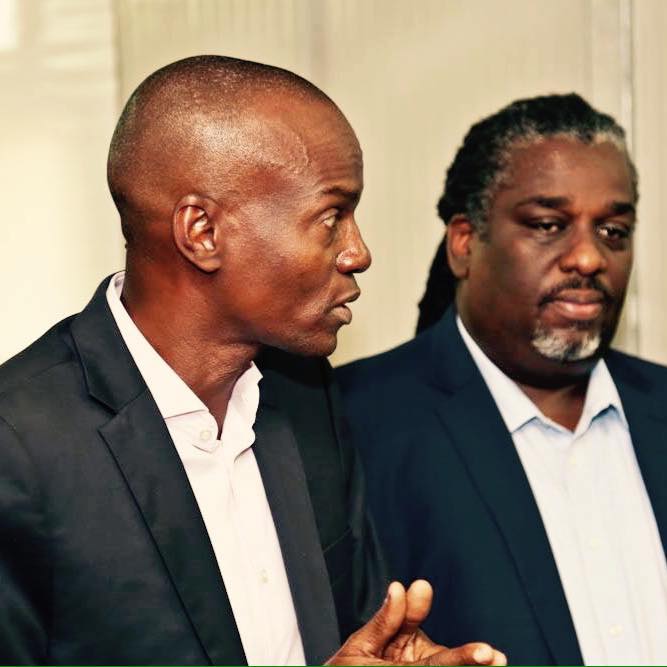
The regime has also been aggressive on the streets. In addition firing live ammunition at demonstrators, journalists have been targeted. Television journalists Alvarez Destiné and Méus Jeanril were shot by unidentified assailants while covering anti-Moïse protests on Feb. 8, and on Feb. 10, Associated Press photographer Dieu Nalio Chéry was wounded in the leg by a police tear-gas grenade, as was journalist Johnny Fils-Aimé. Cops of the CIMO crowd-control unit also placed a fuming tear-gas grenade in the back of a Radio Télé Pacific pick-up truck as journalists used the vehicle to cover protests.
A slight shift of tone in the State Department’s position came late Feb. 16. “I am alarmed by recent authoritarian and undemocratic acts — from unilateral removals and appointments of Supreme Court judges to attacks against journalists,” tweeted Julie Chung, the Assistant Secretary of State for Western Hemisphere Affairs. “Respect for democratic norms is vital and non-negotiable. The United States will not be silent when democratic institutions and civil society are attacked. We condemn all attempts to undermine democracy by violence, suppression of civic freedoms, or intimidation.”
“I am alarmed by recent authoritarian and undemocratic acts,” tweeted the State Department’s Julie Chung.
All this is unfolding in the ferment that always surrounds the national Carnaval (Feb. 14-16), which is being held this year in the impoverished northwestern city of Port-de-Paix, the hometown of Moïse’s wife, Martine.
“I am in Port-de–Paix to officially launch the national carnaval,” Moïse said on Feb. 13 (he had also visited the Carnaval festivities in Jacmel on Feb. 7). “It is an historic moment for this city which in the past has always been treated like a poor relation. Today, it is jubilation at the level of this department which is hosting its first national carnival in the country’s history.”
On Sun., Feb. 14, Dominican authorities arrested former Port-au-Prince mayor Ralph Youri Chevry in the border town of Dajabon, as he attempted to take refuge in the neighboring country. Haitian police had raided and searched Chevry’s Port-au-Prince home the previous week. The National Department of Investigations (the DR’s FBI) is now holding him in Santo Domingo, as Haitian authorities seek his extradition and Haitian rights groups urge he be granted political asylum.
“Fearing for his life, Ralph Youri Chevry, was forced to take refuge in Dominican territory… until democracy is restored in Haiti,” said the National Network for the Defense of Human Rights (RNDDH) wrote in a letter to Dominican Foreign Minister Roberto Álvarez.
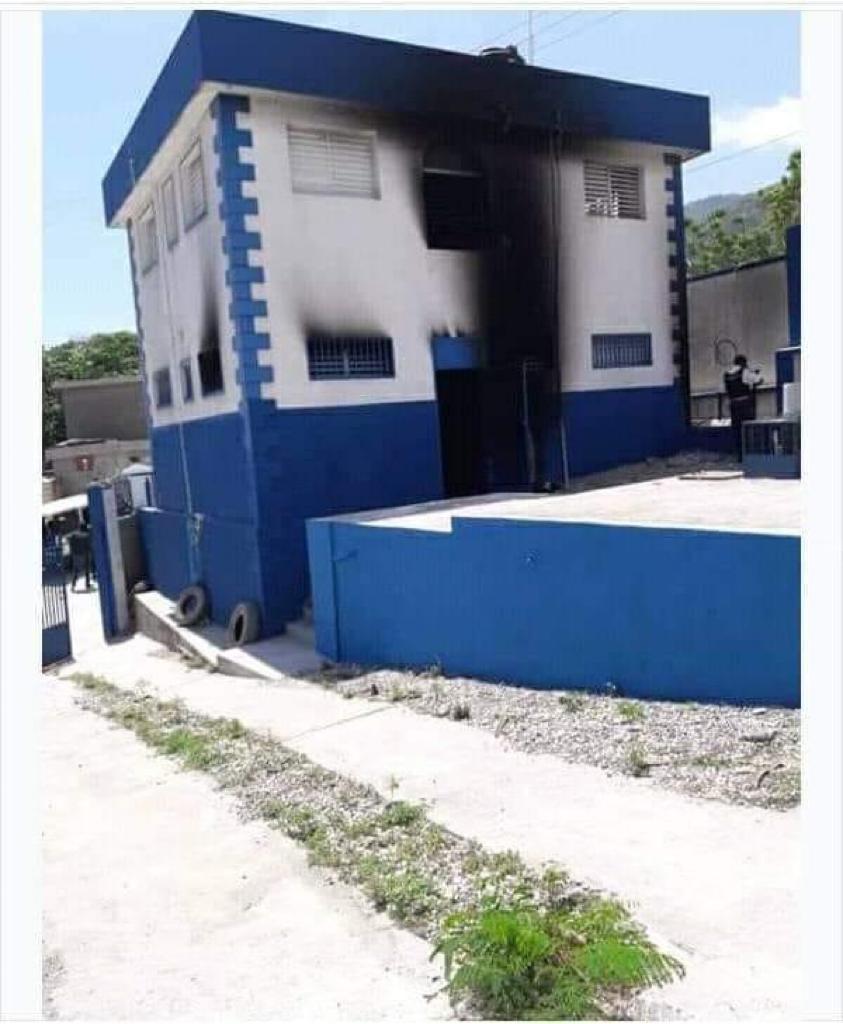
Many international human rights organizations are also issuing statements upbraiding Moïse and Washington. “As U.S.-based law school clinics working in solidarity with Haitian civil society, we are deeply concerned about the deteriorating human rights situation in Haiti and about the U.S. response to date,” wrote human rights law experts from Harvard, Yale, and New York University on Feb. 13. “Credible evidence shows that President Jovenel Moïse has engaged in a pattern of conduct to create a constitutional crisis and consolidate power that undermines the rule of law in the country.”
Rights groups are also rapping Washington for starting, since two weeks ago, the brutal expulsion of 1,800 Haitians – including many children – back to Haiti despite a supposed Biden administration moratorium on deportations.
With demonstrations and returnees growing, the political pressure on Moïse may soon “shift into another gear,” as Haitians are fond of saying. A Feb. 15 attack on a PNH outpost in the Port-au-Prince slum of Grande Ravine may augur what’s to come.
“Heavily armed individuals” attacked the “sub-station,” where they “brutalized and threatened the police officers…, disarmed them, and looted the premises… [of] the police officers’ weapons, two Galil rifles and an M4 rifle (3 automatic assault weapons), a 12 gauge shotgun, several handguns, tear gas grenades, and bulletproof vests, among other things,” reported the Haiti Libre website.
Washington is surely watching such developments with dismay as the political crisis worsens, throwing into doubt their gambit of sticking with Moïse. If things become too hot, they may switch to backing the Haitian opposition’s game plan in order to avoid what could quickly morph into an even more revolutionary struggle.









